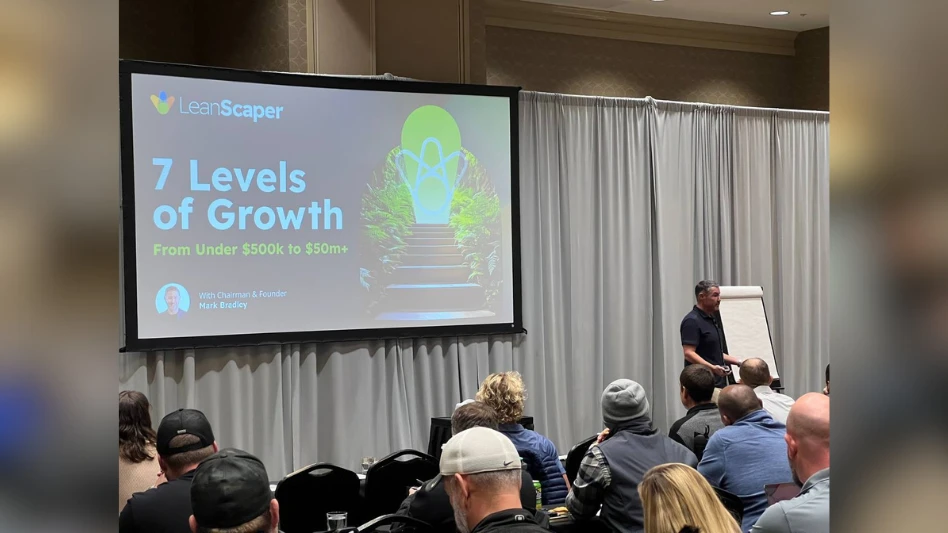
Andrew Hatfield
DETROIT – Mark Bradley says he’s all about uncovering the hard truths.
Take perception versus reality for instance: Bradley asked the LMN Mastermind Sessions attendees to rank themselves on a scale of 1-5 in components like their safety standards and how clear their hiring process is today.
After a few minutes, Bradley – the founder and strategic adviser of LMN – asked the landscapers in the room if they think their employees would rank their companies the same way as their bosses.
“I’ll bet they’d be different than yours,” Bradley says. “If they’re different, who do you listen to – their story or your story?”
Here’s another dose of harsh reality: As landscapers retire or leave the field, there’s fewer and fewer young employees who want to take up those roles. In all trade industries, Bradley says there’s a five Baby Boomer to two replacement ratio. With increasing demand for landscaping services and less workers willing to do the jobs, Bradley took attendees to task for reshaping the industry.
“Why don’t they choose landscaping? It’s not respected,” he says. “We’re the only people who can change it. It’s up to us to change that.”
FINDING THE RIGHT TEAMMATES. At several points during the Mastermind sessions, Bradley told attendees that a company should be able to run without its leader in the room. If it can’t, there’s something wrong.
So, finding quality employees is key. Bradley says he hires for folks who have a growth mindset versus a fixed mindset. “We want people who want more,” he says, adding that this has driven him to finding good interview questions to learn about an employee’s mindset.
One example question: “How do you respond to challenges or obstacles in your work or personal life?” If an interviewee answers that they view challenges as an opportunity to grow, they’ve likely got a growth mindset. If they mention how they want to avoid challenges, they’ve got more of a fixed mindset or are too afraid to confront issues head-on.

Another example: “How do you feel about making mistakes?” If Bradley hears someone say that mistakes are part of their learning process, they’re likely a more viable candidate.
“The objective is to build something special,” Bradley says.
CLEAR AND PRESENT CHANGE. Bradley suggests that if employees say it’s unclear how they can move up the career ladder at their company, the problem can be resolved. The employer just needs to develop a pay structure with clear designations on what needs to be done to reach the next step. Then, printing out the sign and hanging it up so employees can see it every time they walk in the shop is a great step to ensure they feel motivated to reach higher pay and status.
“That in itself might change the culture more than anything,” Bradley says. “I can’t take care of 3,500 customers that pay me for software every month, but I can take care of 150 people who help me do that. If I do that, they’ll take care of the customers.”
Bradley says getting employee feedback is important, but it’s more important to act on that feedback. In some cases, acting fast is vital. If surveyed employees lowly rank their team’s safety standards, then they feel unsafe doing the job. That’s a pressing concern.
NEW INDUSTRY STANDARDS. Bradley says the hardest truth of all is that the reason most young people don’t want landscaping careers is because the landscapers aren’t paying livable wages or treat them with respect. He believes “laborers” should be reframed to “apprentices,” for instance, because in other trades, that word shows a clearer career path.
Bradley suggests landscapers reevaluate the roles most frequently needed at their companies and the skill gaps in those roles. He says it’s important to develop a more professional training curriculum than what currently exists at most companies. Plus, state governments might offer grant money for anyone who’s trying to improve the trades workforce.
In some cases, Bradley says training employees so much that they could actually go get other jobs elsewhere or start their own businesses is important. He showed attendees a quote from Richard Branson, the CEO the Virgin Group: “Train people well enough so they can leave, treat them well enough so they don’t want to.”
“Ultimately, we want to attract more people who can create more revenue per hour,” Bradley says. “They’re there to win, and they’re there to help you win. They understand how to contribute to making more money.”
Latest from Lawn & Landscape
- ExperiGreen, Turf Masters Brands merge
- EquipmentShare cuts ribbon on new Maryland branch
- Strathmore acquires Royal Tree Service in Montreal
- In a new direction
- The December issue is now live
- Ignite Attachments debuts 80-inch, severe-duty bucket
- EquipmentShare breaks ground on Roswell branch
- NaturaLawn of America adds Schwartz, Medd to operations team





